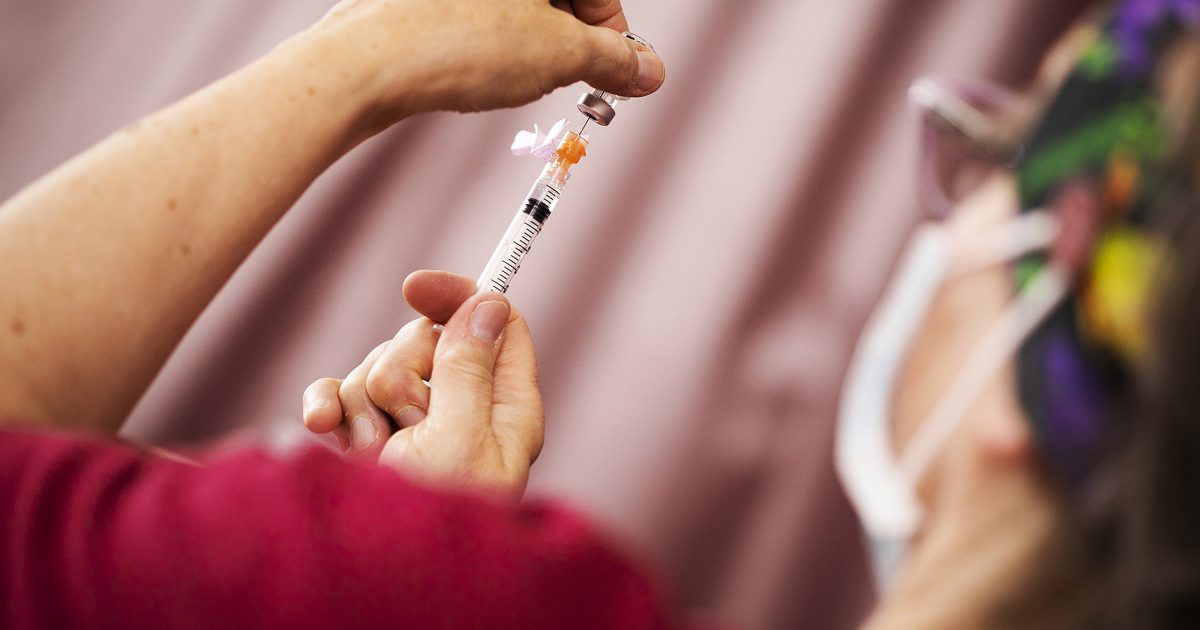
In the three months since Johnson & Johnson’s COVID-19 vaccine received emergency use authorization from the U.S. Food and Drug Administration, more than 10 million Americans have received the vaccine, according to the Centers for Disease Control and Prevention. The single-shot viral vector vaccine — developed in collaboration with Beth Israel Deaconess Medical Center (BIDMC) immunologist Dan Barouch — was authorized for use based on clinical trial data showing strong clinical efficacy against symptomatic COVID-19 in the United States, Latin America and South Africa.
In a new study published in Nature, Barouch, director of BIDMC’s Center for Virology and Vaccine Research, and colleagues report on the antibody and cellular immune responses generated by the Ad26.COV2.S vaccine against the original viral strain and against SARS-CoV-2 variants of concern. The team found that this vaccine induced immune responses against all the viral variants.
“The concern is whether SARS-CoV-2 variants may reduce the efficacy of current vaccines that were designed to protect against the original SARS-CoV-2 strain at the beginning of the pandemic,” said Barouch, senior author of the study and professor of medicine at Harvard Medical School. “These findings therefore have important implications for vaccine protection against SARS-CoV-2 variants of concern.”
To explore the immunogenicity of Ad26.COV2.S, Barouch and colleagues at BIDMC administered one or two doses of Johnson & Johnson’s investigational vaccine to 20 volunteers between the ages of 18 and 55. All volunteers were participants of a larger multicenter, randomized, double-blind, placebo-controlled Phase 1/2a study to evaluate the vaccine at various doses and schedules. The researchers then used multiple methods to assess antibody and cellular immune responses against the original viral strain (WA1/2020) and against the viral variants first identified in South Africa (B.1.1351), the United Kingdom (B.1.1.7), Brazil (P.1), and California (CAL.20C).
Compared to antibody responses against WA1/2020, the data showed reductions in neutralizing antibodies against the B.1.1351 and P.1 strains. In contrast, non-neutralizing antibody responses and T cell responses were minimally impacted or not impacted by SARS-CoV-2 variants. Given the vaccine’s protective efficacy as demonstrated in Phase 3 clinical trials, non-neutralizing antibodies and/or T cell responses may contribute to protection against COVID-19.
The published Phase 3 efficacy data showed that the Ad26.COV2.S vaccine offered strong protection against symptomatic COVID-19 in South Africa and in Brazil where most sequenced COVID-19 cases were caused by variants. The findings contribute to our understanding of vaccine protection against SARS-CoV-2 variants of concern.
“Although the mechanistic correlates of protection for COVID-19 are not yet known, the vaccine’s robust protective efficacy in these regions raises the possibility that non-neutralizing antibodies and/or T cell responses may also contribute to protection,” said Barouch, who is also a member of the Ragon Institute of MGH, MIT, and Harvard. “Alternatively, it is possible that low levels of neutralizing antibodies are sufficient for protection against COVID-19.”
Co-authors included Galit Alter of the Ragon Institute of MGH, MIT, and Harvard; Jingyou Yu, Jinyan Liu, Abishek Chandrashekar, Erica N. Borducchi, Lisa H. Tostanoski, Katherine McMahan, Catherine Jacob-Dolan, Aiquan Chang, Tochi Anioke, Michelle Lifton, Joseph Nkolola and Kathryn E Stephenson of BIDMC; Caroline Atyeo, Sally Shin of the Ragon Institute of MGH, MIT and Harvard; David R. Martinez, Ralph S. Baric of University of North Caroline at Chapel Hill; Paul Fields, Ian Kaplan and Harlan Robins of Adaptive Biotechnologies; Fatima Amanat and Florian Krammer of Icahn School of Medicine at Mount Sinai; Mathieu Le Gars, Jerald Sadoff, Anne Marit de Groot, Dirk Heerwegh, Frank Struyf, Macaya Douoguih, Johan van Hoof and Hanneke Schuitemaker of Janssen.
This work was supported in part by Janssen Vaccines & Prevention, BV; the Ragon institute of MGH, MIT and Harvard; the Massachusetts Consortium on Pathogen Readiness (MassCPR); the Musk Foundation; the National Institutes of Health (grants CA260476, AI007151, AI 152296): the Boroughs Wellcome Fund Postdoctoral Enrichment Program Award; a Hannah H. Gray Fellowship from the Howard Hughes Medical Institute; federal funds from the Office of the Assistant Secretary for Preparedness Response, Biomedical Advanced Research and Development Authority under other transaction agreement HHS01002017 00018C.
